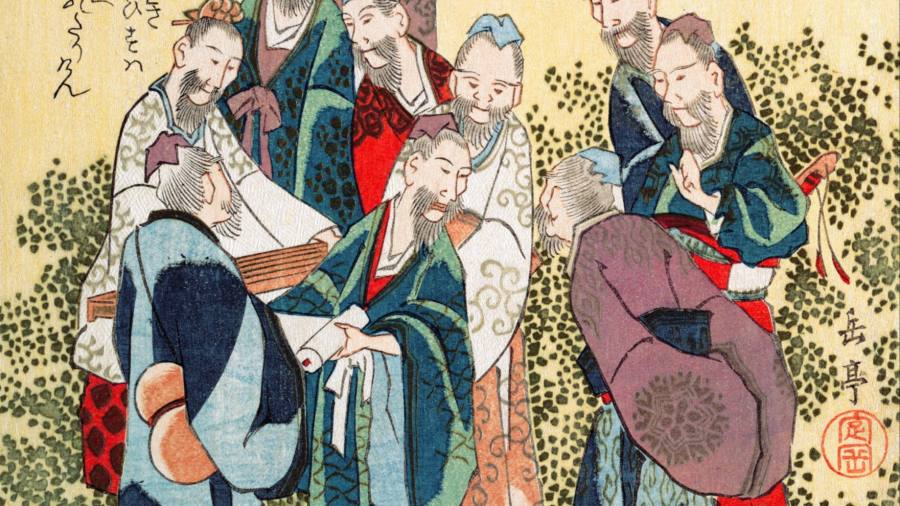Receive free Life & Arts updates
We’ll send you a myFT Daily Digest email rounding up the latest Life & Arts news every morning.
Can you name four of China’s imperial dynasties? Can you put them in chronological order? Which two languages in India have the most native speakers? What is the significance of 1868 in Japanese history? What is the second most popular religion in Indonesia?
Alright, now let’s push you a bit. Which is the only south-east Asian country that wasn’t colonised by Europeans? The Imjin War was perhaps the largest anywhere on Earth in the 16th century. Which countries fought it? How many words could you write about the life of the Buddha before exhausting your knowledge? Or of Confucius? Could you blag a paragraph? What was the former’s name?
This test isn’t — or shouldn’t be — daunting. On the Everest of Asian history, these subjects amount to a dusting of snow. But what share of graduates in the west would get a pass mark? Even among the engagé, the podcast-streaming news addicts, would it be as much as 5 per cent? And how, given the unfolding tale of this century, is such ignorance at all tenable?
Don’t take this column for a cosmopolitan’s lament. It is not a plea for inter-cultural understanding. Nations should privilege the teaching of their own past (and, within reason, gloss it). I just wonder about the strategic wisdom of knowing so little of a continent whose gravitational pull on the west isn’t going to lessen.
If there is a hole in education, it is not the one everyone talks about. Yes, Stem subjects should rise in prestige and funding against the humanities. But that is already in train. Student enrolment in English majors is down in the US. Britain is on its second consecutive maths-fixated prime minister. The larger problem is within the humanities, which aren’t as universal, as species-spanning, as the name promises. It is possible to master them, to be seen as a person of sublime education, without even an outline sense of the Asian past.
In his lecture on “The Two Cultures”, CP Snow spoke of his eerie hunch, at elevated social gatherings, that those around him couldn’t explain what is meant by “mass” or “acceleration”. (Questions he described as the “scientific equivalent of saying, ‘Can you read?’ ”)
Well, on my own social outings, I sometimes emerge over the course of the evening as an expert on Asia. It is difficult to overstate the wackiness of this. I can’t speak an Asian language. I visit a couple of times a year, mostly to eat. I have lived there only as an infant. Even treating it as one place throughout this column, as though it were as coherent as Europe, suggests an outsider’s innocence. Knowing that the Tang came before the Song shouldn’t be enough to distinguish one in polite society. I’m afraid it is.
Once in a while, a public intellectual cuts through the provinciality. The kings-and-queens approach to history, in which a telegenic Sloane points at castles a lot, gives way. Peter Frankopan has popularised a more Persia-centric view of the past. A lifetime earlier, Steven Runciman changed perceptions of the world east and south of Greece among the intelligent laity. But the fact that such Asia-facing work is hailed as maverick is exactly the problem, no? A passing acquaintance with that material should be the entry fee into the elite, not a kind of bonus exotica.
Acquiring the knowledge might even be morale-lifting for the west. European countries are not, by world standards, ancient. (So cool the spent-force rhetoric.) Nor were they uniquely imperial. (So put the guilt in context.) No, the US didn’t “let” China become a superpower again. That state of affairs is more like the historical default. (So don’t self-recriminate.)
Educational parochialism made sense when the west had a preponderant share of the world’s output and armaments. Now? As I write this, Joe Biden is cultivating Narendra Modi in Washington. Saudi Arabia, unsatisfied with turning golf upside down, is tempting European footballers as prime-age as Bernardo Silva. What a sports fan might recognise as the “field tilt” of the globe is changing. What it means to be an educated person will have to — is going to — change with it.
Email Janan at [email protected]
Find out about our latest stories first — follow @ftweekend on Twitter
Read the full article here




